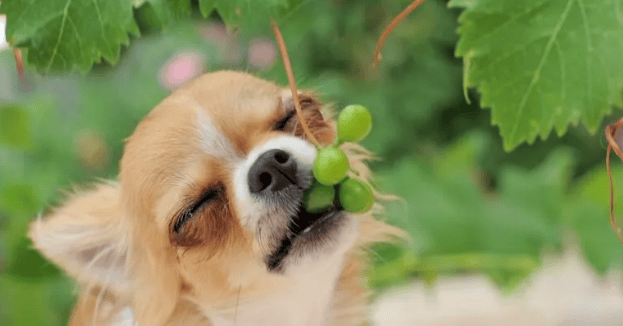Although dogs are carnivores, they sometimes eat some fruits. However, not all fruits are safe for dogs. Some fruits may be harmful to your dog’s health, and some are even strictly contraindicated. Here are the top ten forbidden fruits for dogs.

1. Grapes and raisins
Dogs cannot eat grapes and raisins because these foods contain unknown toxic substances that are harmful to the dog’s kidneys. Specifically, dogs who ingest grapes and raisins can develop acute kidney failure and possibly death.
Currently, scientists have not determined what the toxic substances in grapes and raisins are, nor are they sure why only some dogs develop symptoms of kidney failure after ingesting them. Therefore, to protect your dog's health, experts recommend avoiding grapes and raisins as dog food altogether.
If your dog accidentally eats grapes or raisins, please contact your veterinarian immediately for consultation, even if symptoms have not yet appeared.
2. Citrus fruits
Dogs cannot eat citrus fruits, such as oranges, tangerines and lemons, mainly because these fruits contain citric acid and citrus oil. May be harmful to your dog's digestive and nervous systems. Specifically, citrus fruits may cause digestive problems such as indigestion, diarrhea, vomiting, and abdominal pain in dogs. They may also cause neurological problems, such as symptoms of a bumpy gait or excessive excitement.
In addition, the peels and pits in citrus fruits can also be harmful to dogs. The peel may contain toxic pesticide residues or other harmful substances, while the core may cause intestinal blockage or suffocation.
To sum up, in order to protect the health of dogs, it is best not to let them eat citrus fruits. If your dog accidentally eats citrus fruit, his health should be monitored closely and seek medical attention immediately if he develops unusual symptoms.
3. Cherries
Dogs cannot eat cherries because cherries contain cyanide, a chemical that is toxic to dogs. Cyanide interferes with your dog’s oxygen delivery mechanism, potentially causing poisoning. Specifically, the cyanide in cherries can damage hemoglobin, making it unable to effectively transport oxygen to various parts of your dog's body, leading to tissue hypoxia.
Cherry pits are also a problem, as they can cause intestinal blockage or poisoning. In addition, the pulp in cherries may be too sour, which can easily cause digestive discomfort in dogs, such as diarrhea and vomiting.
Therefore, in order to protect the health of dogs, it is best not to let them eat cherries. If your dog accidentally eats cherries, monitor his health closely and seek medical attention immediately if he develops unusual symptoms.
4. Peaches
Dogs cannot eat peaches, mainly because peaches contain stone fruits, which may cause serious harm to the dog’s digestive system. The pits of peaches contain cyanide, a poisonous substance that is very dangerous to dogs. When dogs swallow peach pits, they may cause cyanide poisoning, which may manifest as vomiting, diarrhea, abdominal pain, fatigue, difficulty breathing and even coma. In severe cases, it may be life-threatening.
In addition, the pulp of peaches also contains fructose and fiber. Excessive intake may cause indigestion, leading to diarrhea or intestinal discomfort. Therefore, for your dog's health and safety, you should avoid letting your dog eat peaches, especially making sure to remove the pits. If your dog accidentally eats a peach or peach pit, contact your veterinarian immediately for consultation and treatment.
5. Apricots
Dogs cannot eat apricots, mainly because apricots contain mandelic acid and cyanide, which are toxic to dogs. Specifically, the pits of apricots contain mandelic acid, a toxic substance that can cause poisoning. Cyanide in apricots is also a risk factor and may interfere with your dog’s oxygen delivery mechanism, leading to poisoning.
When dogs swallow apricots, they may suffer from poisoning symptoms such as vomiting, diarrhea, abdominal pain, fatigue, difficulty breathing, and even coma. In addition, the pits of apricots may cause intestinal blockage or suffocation, posing a serious threat to the health of dogs.
Therefore, for the health and safety of your dog, you should avoid letting your dog eat apricots, especially making sure to remove the apricot pits. If your dog accidentally eats an apricot or apricot pit, contact your veterinarian immediately for consultation and treatment.
6. Durian
Dogs cannot eat durian, mainly because durian may cause indigestion and allergic reactions in dogs. Durian is a special fruit with a strong smell and taste, but it is not suitable for dogs to eat.
First of all, durian pulp contains high fat and sugar. Excessive intake may cause digestive system problems such as indigestion, diarrhea and vomiting in dogs. Secondly, durian may cause allergic reactions in dogs, manifesting as skin itching, difficulty breathing, indigestion and other symptoms. In addition, the skin and core of durian may also be harmful to dogs. The peel may contain pesticide residues or other harmful substances, and the core may cause intestinal blockage or suffocation.
Therefore, for the health and safety of dogs, dogs should avoid eating durian. If your dog accidentally eats durian, your dog's health should be closely monitored and if unusual symptoms appear, seek medical attention immediately.
7. Core fruits
Dogs cannot eat core fruits, such as hazelnuts, almonds, etc., mainly because these cores contain cyanide, which is toxic to dogs. Cyanide is a toxic substance that interferes with oxygen delivery in dogs, causing poisoning. Specifically, the cyanide in the fruit core can destroy the function of hemoglobin, making it unable to effectively transport oxygen to various parts of the dog's body, resulting in tissue hypoxia.
In addition, fruit pits are usually hard and can easily cause intestinal blockage or suffocation, which is especially dangerous for small dogs. The core may also contain other harmful substances, such as cyanide in almonds, which can cause damage to the dog’s digestive system and nervous system.
Therefore, for the health and safety of dogs, be sure to remove the pits from pit fruits before feeding them to dogs. If your dog accidentally ingests stone fruit, his health should be closely monitored and if any unusual symptoms appear, seek medical attention immediately.

8. Watermelon
Dogs Generally speaking, watermelon can be eaten, but it should be noted that when dogs eat watermelon, it is best to remove the seeds. At the same time, when feeding seedless watermelon to dogs, you also need to pay attention to the amount of food, because seedless watermelon contains a large amount of Water, excessive consumption may cause diarrhea in dogs. In addition, although watermelon is rich in water and vitamins, it also contains a certain amount of sugar, so it is recommended to feed it in moderation and not to overdose to avoid problems such as indigestion or obesity. It’s best to cut watermelon into small pieces and feed it to your dog as a treat or reward rather than as a main meal. If the dog develops symptoms of discomfort, such as vomiting, diarrhea, etc., stop feeding in time and observe its condition. If the symptoms persist or worsen, seek medical treatment in time.
9. Lychee
Dogs cannot eat lychee because lychee contains lychee toxin, which may be harmful to the health of dogs. Lychee toxins are mainly found in the testa and seeds of lychees, but may also be present in the pulp. Lychee toxins may cause hypoglycemia in dogs, manifesting as symptoms of weakness, fatigue, loss of appetite, and even coma. In some cases, lychee toxins may also cause damage to the nervous system, causing convulsions and other neurological symptoms.
In addition, lychees may also cause indigestion in dogs, manifesting as diarrhea, vomiting and other symptoms. Therefore, for the health and safety of your dog, you should avoid letting your dog eat lychees. If your dog accidentally eats lychees, your dog's health should be closely monitored and if unusual symptoms appear, seek medical attention immediately.
10. Apples
Dogs can eat apples, but be careful to remove the apple core and seeds in the core, because the apple core and apple seeds contain cyanide, which is harmful to dogs. poisonous. Cyanide can interfere with oxygen delivery in your dog's body, causing poisoning. So when giving apples to dogs, be sure to remove the core and seeds.
In addition, apples contain a large amount of fructose and fiber. Eating them in moderation is beneficial to dogs, but excessive consumption may cause problems such as indigestion or diarrhea. Therefore, when eating apples for dogs, you should control the amount in moderation. It is better to cut them into small pieces or eat them in puree form.
In general, while dogs can enjoy some fruits, some are off-limits to them. When giving fruit to dogs, be sure to choose fruits that are safe for them and remove the core and peel. If you're not sure whether a certain fruit is suitable for your dog, ask your veterinarian for advice. With the right diet, we can ensure that our dogs have a healthy and happy life.

 扫一扫微信交流
扫一扫微信交流
发布评论